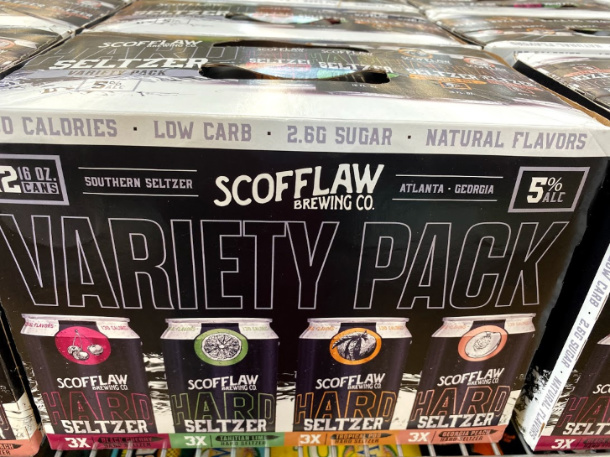Standin’ at the crossroad, baby, risin’ sun goin’ down
Standin’ at the crossroad, baby, eee-eee, risin’ sun goin’ down
I believe to my soul, now, poor Bob is sinkin’ down
– From “Cross Road Blues” by Robert Johnson
Lew Bryson, bless his booming laugh, has written about the soul of beer. In the first years I posted at Appellation Beer the tagline here read, “In search of the soul of beer.” I had to lean on the Wayback Machine to find a copy of the old logo.

I changed the tag to “celebrating beer from a place” because I thought it would result in fewer questions like “why appellation?” Also, a lengthy discussion here sometime later documents the sort of trouble a blogger can get into suggesting some beers might have soul and others could be soulless.
Anyway, Bryson writes, “Those pioneering beers were great because of the heart and soul of the people who made them. I don’t want to see the soul go away. I don’t think that the beer world as we know it today could survive that.”
And, to get to the point, “The soul is at risk because craft brewing doesn’t know what it means anymore, and it all comes down to hard seltzer.”
You really should give it a read, because I don’t know where to stop quoting. This seems pretty important: “[Hard seltzer] is not craft. It’s fermenting sugar and adding flavor to a drink that has been stripped of all flavor.”
To this I would add something Tomme Arthur of Lost Abbey/Port Brewing said during his keynote speech at the Brewbound Live conference a couple of months ago in California. “Thank god Seltzer has arrived and brought with it a stunning sense of terroir. I don’t know about you, but I for one can’t wait to read stories about third generation dextrose farmers.”
Two topics that always come up when I visit breweries these days are hard seltzer and hop creep. And, indicating some have been thinking long and hard about the things Bryson writes about, discussions about hard seltzer often include words like ethos and soul.
Plenty of breweries have pivoted quickly and begun to produce hard seltzer. It’s pretty obvious why. Last week, Brewbound reported that financial services firm Credit Suisse predicts hard seltzer could grow to between 8 and 10% of total beer industry volume by 2023. And this has more than brewers concerned. Panelists at the Unified Wine & Grape Symposium in California earlier this month agreed the biggest threat to wine right now is hard seltzer.
“A lot of us think of a 24-year-old drinking White Claw out on the beach or at a backyard barbecue,” says Jordan Kivelstadt, founder of Kivelstadt Cellars, “but when you actually look at the demographics of hard seltzer, it’s much broader. It’s more affluent, it’s college educated, and the age range is a lot wider” than people assume.

This hard seltzer variety pack recently showed up at our local Kroger. Scofflaw Brewing otherwise is known for a range of bold, in-your-face beers and its “iconoclastic attitude.” The brewery is still pumping out excellent IPAs — IPA month began Saturday at Summits Wayside Taverns (the restaurants I wrote about at part of #FlagshipFebruary) with 50 IPAs on tap and six of them are from Scofflaw — but it is a business in business to do business. And there is money to be made producing hard seltzer.
How is this different than family friendly brewpubs producing (non-alcoholic) root beer for their under-21 customers? Than brewpubs stocking wine for their non-beer drinking customers? Or selling gluten-free beer made elsewhere? Again, read what Bryson writes to the end. He mentions several brewers, by name, as “guardians of craft brewing’s soul.”
I would suggest the thousands that sell their beer mostly to their neighbors are equally important. They’ve established relationships with their customers that might make, in some case, producing hard seltzer seem perfectly reasonable. Personally, I don’t care one way or the other about the fact that Scofflaw makes Southern Seltzer. I’m still going to order the occasional pint of Basement IPA at Manuel’s Tavern. On the other hand, if Jester King Brewery or Birds Fly South Ale Project or Halfway Crooks Beer were to start making hard seltzer I would feel like I had been lied to.
At the wine conference, Kivelstadt pointed out one reason hard seltzer is having a moment is that people perceive it as a healthy alternative. Wine, he says, should promote that it is more natural and more authentic. “We take grapes that we grow in the earth and turn them into a product. As an industry we need to stand up and yell it from the rooftops. People want to know that [the food and drink] they are consuming came from a real place, so we have an opportunity to take this moment to define why wine is the best and most sustainable beverage.”
Make the right substitutions and that paragraph could be about beer from a place. I’d suggest such beers might have soul, but I’ve already learned not everybody agrees.